The environment after COP26: an opportunity for brands (1)

Three out of four Canadians (76%) believe that we are in the process of destroying the entire planet!
Not only has this regrettable idea almost attained consensus among the Canadian population, but the proportion of Canadians with this opinion has only continued to rise over the last 10 years (from 62% in 2012), until stabilizing in 2020 with the pandemic.
(1) This is an update of an article published on the CROP website on September 27, 2019
The environmental apocalypse
Canada, 2012-2021, 2021 Panorama Study
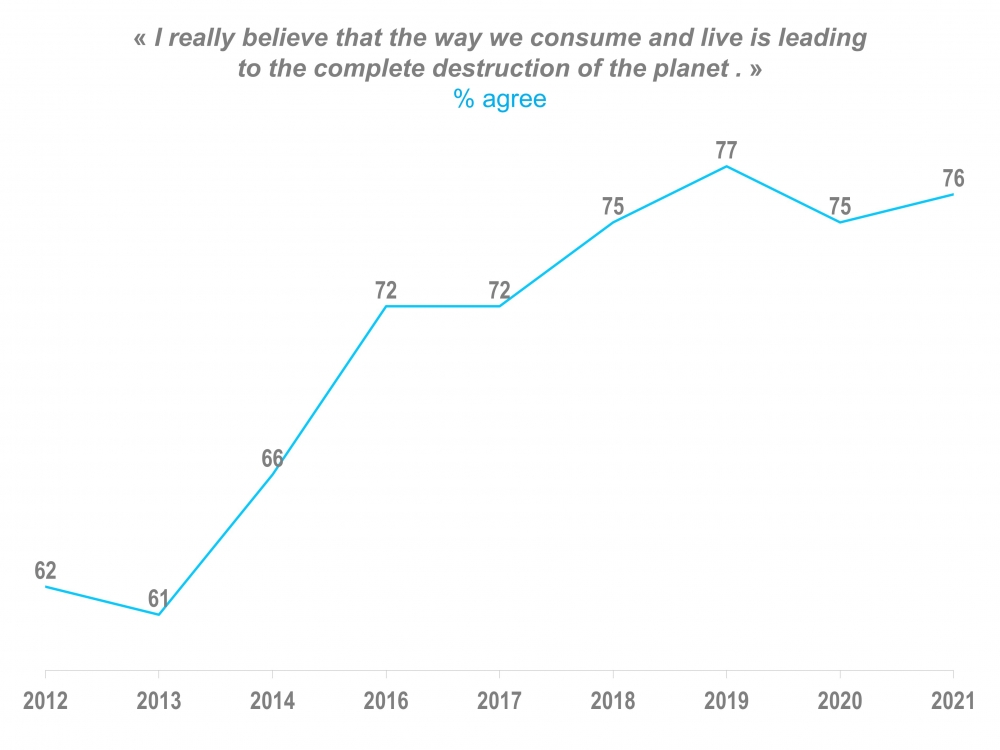
Contribution to the environment
Canada, 2009-2021, 2021 Panorama Study
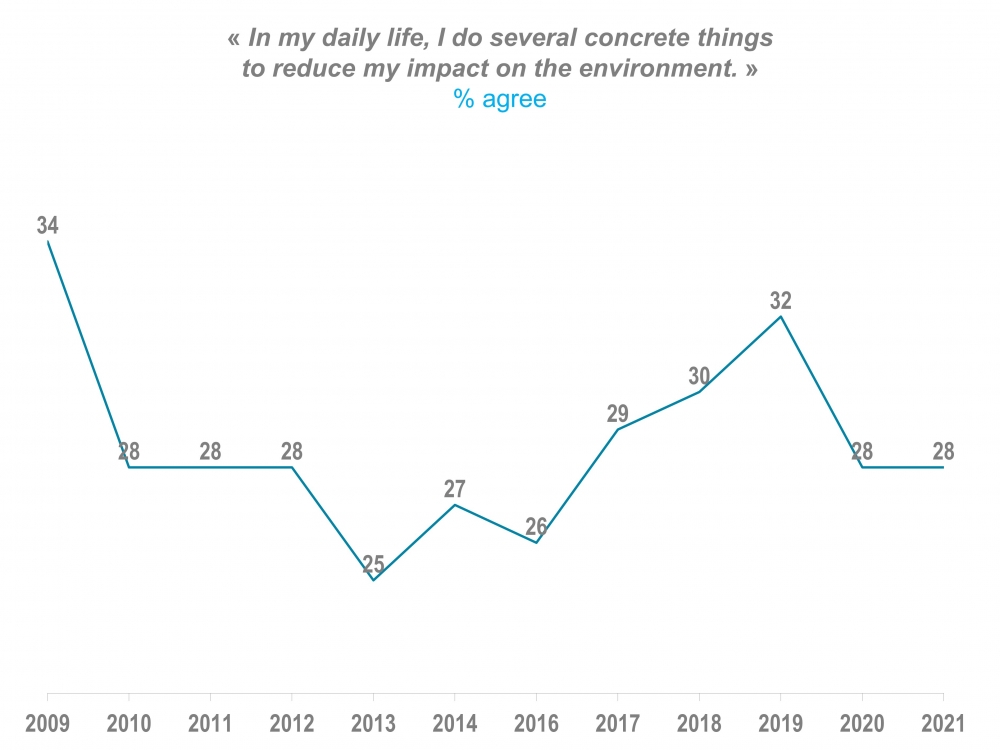
It is interesting to observe the impact that crises have on the motivation to do something about the environment. In the aftermath of the financial crisis of the late 2000s, just as it did from the start of the COVID-19 pandemic in 2020, this motivation declined. People focus on the economy during such periods. When the economy is doing well, as it did from 2013 to 2019, people’s attention returns to the environment. This suggests that we will probably see this indicator rise again in coming years in a post-pandemic recovery.
Note that the previous graph shows only those who totally agree with our statement, those we consider the most committed to the cause.
However, even people who only somewhat agree with our statement are still demonstrating some level of commitment, albeit to a lesser degree. The popularity of recycling, the use of reusable grocery bags, etc.: the multiplicity of small gestures like these have created a minimum level of environmental awareness. When we include everyone who agrees with our statement, we get 84% of Canadians in 2021.
We can therefore conclude that the planet's ecological problems, climate change and its consequences, have become very important issues for Canadians.
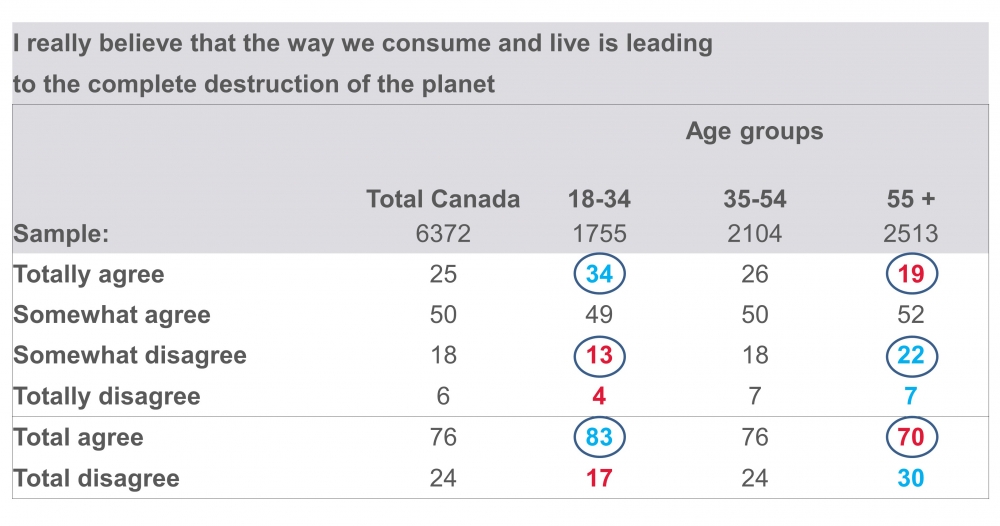
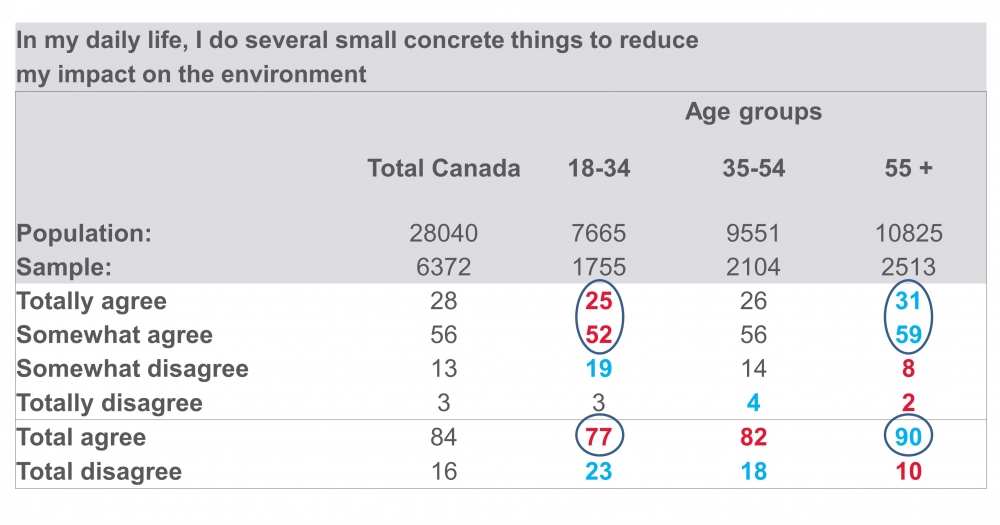
This even minimal reluctance of younger people to take concrete action for the environment seems quite sociologically significant to us. While this younger group feel they lack the levers necessary to make a strong impact on climate change, they believe that governments, institutions, companies and brands do have the resources, unlike them, to make a real difference. Hence, the protests by young people in the streets of the world’s major capitals demanding that these parties take action with all the means at their disposal.
A progressive movement in several respects
It is also very interesting to observe how personal values relate to people’s level of engagement with today’s environmental issues. The 28% of Canadians who report being very committed to taking environmental action are highly motivated by progressive values on multiple fronts (as measured by our Panorama program). Their fundamental idealism encompasses personal fulfillment and equal opportunity for all. These environmentally “engaged” individuals are very sensitive to the plight of others and to social diversity and feel highly mobilized by all issues relating to social responsibility. They see environmental issues as a very real threat to individuals, communities and humanity at large. Family is also very important to them. Some are anxiously wondering what will happen to the next generations because of climate change. They are questioning the legacy we are leaving to the next generations. In fact, these engaged individuals feel that their personal potential, as well as the potential of humanity generally, will be greatly eroded if concrete and ambitious actions are not taken quickly to reduce the carbon footprint from human activity.
The conditions for a mass movement
In the aftermath of the COP26 conference, one would hope to see a greater percentage of the population wanting to get involved to reduce their impact on the environment. While 28% of Canadians totally agree that they are taking concrete steps to to this, more than half (56%) somewhat agree that they are doing this. This means that their contribution is probably minimal (although better than nothing).
"Contribution to the environment
Canada, 2021 Panorama Study
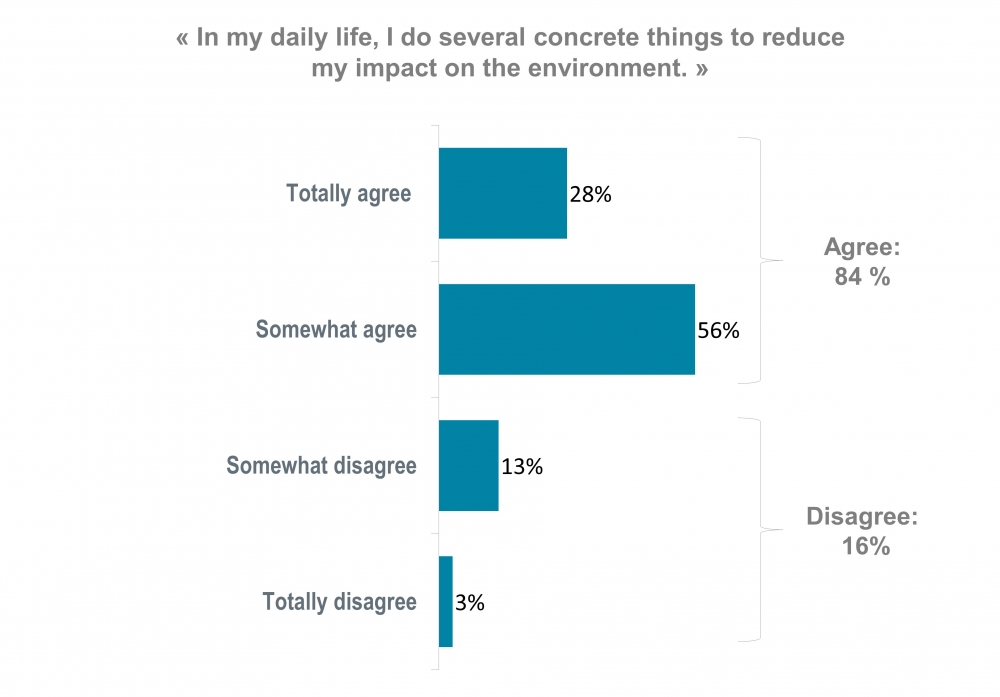
Moreover, a thorough examination of their hot buttons and mental postures tells us that they feel they lack sufficient control to make a real difference to today’s pressing environmental issues through their own daily actions. Instead, they feel overwhelmed by the scale and complexity of the challenges.
Like some of the younger generation, they tend to believe that it is the responsibility of corporations, brands and institutions to act because they have the resources to make a significant impact on these kinds of issues.
It therefore appears that institutions and corporations will have to step up and take a leadership role if we want to mobilize the masses and generate the kind momentum for action and popular engagement around climate issues that would push large segments of the population to take concrete measures on a regular basis.
An opportunity for brands (companies and institutions)
In light of the magnitude of the challenge that global warming represents for humanity, people will welcome organizations that offer solutions. Given the emotional connection that some brands have (or hope to have) with their customers, the opportunity is obviously to engage them around this issue. And this doesn’t apply to strictly commercial brands. “Citizen brands,” non-profit organizations and institutions can also find the same opportunities here. The approach should touch three main lines of motivations... Initiate a project that will be beneficial for the environment, global warming, etc.; Invite stakeholders (users, customers, etc.) to create communities of action; Give participants a sense of control: Together we can make a difference! Our findings are clear. The environment is very important to a large percentage of the market and population. But how to fix things is not as obvious and many feel that their personal contribution will make no difference given the immensity of the problem. When brands show leadership on this issue – by creating movements, unifying users and stakeholders behind the same goals, giving them some control, contributing significant resources to the cause – they can have a mobilizing effect on all those who feel powerless. In so doing, these brands will surely benefit from enhanced loyalty and engagement from their customers. And hopefully the planet will benefit, as well.